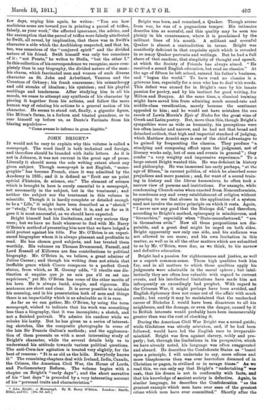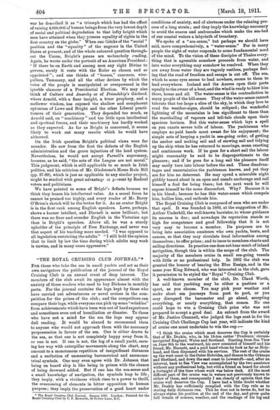JOHN BRIGHT.* IT would not be easy to explain why
this volume is called a monograph. The word itself is both technical and foreign, and therefore should be branded with italic letters. As it is not in Johnson, it was not current in the great age of prose. Literally it should mean the sole writing extant about any given subject. Though monograph is not English, " mono- graphie " has become French, since it was admitted by the Academy in 1835; and it is defined as " Ecrit sur un point special d'histoire, de science, etc." The element of science which is brought in here is surely essential to a monograph, not necessarily in the subject, but in the treatment ; and neither the subject nor the treatment in this volume is scientific. Though it is hardly complete or detailed enough to be a " Life," it might have been described as a " sketch " or "study," for that, in truth, is what it is, and so far as it goes it is most successful, as we should have expected.
Bright himself had his limitations, and very serious they were; but we have no fault whatever to find with Mr. Barry O'Brien's method of presenting him now that we have lodged a mild protest against his title. For Mr. O'Brien is an experi- enced biographer whom it is always pleasant and profitable to read. He has chosen good subjects, and has treated them worthily. His volumes on Thomas Drummond, Parnell, and Lord Russell of Killowen are fine contributions to political biography. Mr. O'Brien is, we believe, a great admirer of Julius Caesar ; and though his writing does not attain that ineffable grace which Cicero compares to a perfect Greek statue, from which, as M. Goumy adds, "il resulte une dis- tinction si exquise qne je ne sais pas s'il en est une superieure," yet Mr. O'Brien has some of the other merits of his hero. He is always lucid, simple, and vigorous. His sentences are short and clear. It is never possible to mistake his meaning, and in his presentation both of men and things there is an impartiality which is as admirable as it is rare.
As far as we can gather, Mr. O'Brien, by using the term monograph, wished to indicate that his work was something less than a biography, that it was incomplete; a sketch, and not a finished portrait. We admire his candour while we rebuke his laxity. But he has given us a series of interest- ing sketches, like the composite photographs in some of the late Sir Francis Galton's methods ; and the agglomera- tion of them presents us with a most interesting study of Bright's character, while the several details help us to understand his attitude towards various political questions. The anti-Corn-law agitation is treated very slightly, for the best of reasons : " It is as old as the hills. Everybody knows it." The remaining chapters deal with Ireland, India, Canada, the Crimea, the American Civil War, the House of Lords, and Parliamentary Reform. The volume begins with a chapter on Bright's "early days "; and the short narrative of his " last days " is preceded by a very interesting account of his "personal traits and characteristics."
• John Bright : a Monograph. By E. Barry O'Brien. London : Smith, Elder, and Co. DO& 6d. net.] Bright was born, and remained, a Quaker. Though averse from war, he was of a pugnacious temper. His intimates describe him as scornful, and this quality may be seen too plainly in his countenance, where it is proclaimed by the militant lines of Ms mouth. A militant and scornful Quaker is almost a contradiction in terms. Bright was manifestly deficient in that exquisite spirit which is revealed in so ma-ay Quaker portraits and writings. But he had a full share of that candour, that simplicity of thought and speech, at which the Society of Friends has always aimed. " He received a sound English education, but read no classics." At the age of fifteen he left school, entered his father's business, and " began the world." To have read no classics is a grievous loss, especially for a man who has to deal with words. This defect was atoned for in Bright's case by his innate passion for poetry, and by his instinct for good writing, for Milton and Bunyan. At the same time, a classical training might have saved him from admiring much second-rate and middle-class versification, merely because the sentiment appealed to him ; and be would not have mistaken the eau sucree of Lewis Morris's Epic of Hades for the great wine of Greek and Latin poetry. But, more than this, though Bright's sympathies were as wide as humanity, his perceptions were too often insular and narrow, and he had not that broad and detached outlook, that high and impartial standard of judging, which Matthew Arnold says is one of the chief advantages to be gained by frequenting the classics. They produce " a steadying and composing effect upon the judgment, not of literary works only, but of men and events in general" ; they confer " a very weighty and impressive experience." To a large extent Bright wanted this. He was deficient in history and philosophy. He was immersed too early perhaps, " at the age of fifteen," in current politics, of which he absorbed some prejudices and more passion ; and, for want of a sound train- ing in history and the literae humaniores, he often took a narrow view of persons and institutions. For example, while condemning Church-rates when exacted from Nonconformists, he condemns any and every establishment of religion without appearing to see that abuses in the application of a system need not involve the entire principle on which it rests. Again, " I never saw any good that the Bishops did," and therefore, according to Bright's method, episcopacy is mischievous, and "hierarchies," especially when "State-manufactured," "are in themselves evils." Now all these propositions are dis- putable, and a great deal might be urged on both sides. Bright apparently saw only one side, and his audience was not allowed to see more ; and his own limitation in this matter, as well as in all the other matters which are submitted to us by Mr. O'Brien, were due, as we think, to his narrow and defective education.
Bright had a passion for righteousness and justice, as well as a superb common-sense. These high qualities took him far, and in all matters to which these qualities apply his judgments were admirable in the moral sphere ; but intel- lectually they are often less valuable with regard to current events, and his intellectual limitations have made him not infrequently an exceedingly bad prophet. With regard to the Crimean War, it might perhaps have been avoided, and English diplomacy does not come out of the affair with much credit ; but surely it may be maintained that the unchecked career of Nicholas I. would have been disastrous to all his neighbours, and the damage, or even the danger, caused by it to British interests would probably have been immeasurably greater than was the cost of checking it.
During the American Civil War Bright was a sound guide; while Gladstone was utterly mistaken, and, if he had been followed, would have led the English race to irreparable mischief. Bright was firm against slavery, nobly and pro- perly; but, through the limitations in his perspective, which we have already noted, his language was often exaggerated and absurd. He describes the Confederate States as " based upon a principle, I will undertake to say, more odious and more blasphemous than was ever heretofore dreamed of in Christian or pagan, in civilised or in savage times." A. we read this, we can only say that Bright's "undertaking" war rash, that his dream is not in conformity with facts, and that his knowledge of ancient society is defective. Again, in similar language, he describes the Confederation " as the greatest example which men have ever seen of the greatest crime which men have ever committed." Shortly after the
war he described it as " a triumph which has had the effect of raising 4,000,000 of human beings from the very lowest depth of social and political degradation to that lofty height which men have attained when they possess equality of rights in the first country on the globe." When one thinks of the "social " position and the "equality" of the negroes in the United States at present, and of the whole coloured question through- out the Union, Bright's pinans are melancholy reading. Again, he wrote under the portrait of an American President : " if there be on Earth and among men any right Divine to govern, surely it rests with the Ruler so chosen and so appointed "; and one thinks of " bosses," caucuses, wire- pullers, Tammany, and all the other devices by which the voice of the people is manipulated or overpowered in the ignoble clamour of a Presidential Election. We may also think of Culture and Anarchy or of Friendship's Garland, where Arnold, with a finer insight, a truer prophecy, and a mellower wisdom, has exposed the shallow and complacent optimism of Lowe and Bright and the other Liberal practi- tioners of their generation. They depended too much, as Arnold said, on " machinery " and too little upon intellectual and spiritual forces, and their machinery has hardly worked as they expected. As far as Bright is concerned, it seems likely to work out many results which he would have abhorred.
On the Irish question Bright's political views were far sounder. He saw from the first the defects of the English administration and the grave injustices of the land system. Nevertheless, he would not accept Parnell's supremacy, because, as he said, "the acts of the League are not moral." This judgment, which is still applicable to so much in Irish politics, and his criticism of Mr. Gladstone's Home Rule Bill (pp. 87-89), which is just as applicable to any similar project, might be studied with great advantage at present by Radical voters and politicians.
We have pointed to some of Bright's defects because we think they lessen his intellectual value. As a moral force he cannot be praised too highly, and every reader of Mr. Barry O'Brien's sketch will be the better for it. As an orator Bright is in the first rank among English speakers. Lowe, perhaps, shows a keener intellect, and Disraeli is more brilliant; but there was no finer and sounder English in the Victorian age than in Bright's speeches. Above all, he was a sturdy upholder of the principle of Free Exchange, and never was that aspect of his teaching more needed. "I was opposed to all legislation restricting the adults." " I still hold the opinion that to limit by law the time during which adults may work is unwise, and in many cases oppressive."











































 Previous page
Previous page